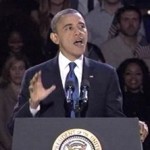Le 6 novembre dernier, il n’y a avait pas seulement les Républicains à Washington pour regretter la défaite de leur champion aux élections américaines . Au même moment, dans les couloirs de la Knesset à Jérusalem, de nombreux élus du Likoud regardaient, livides, les résultats tomber en faveur de Barak Obama. Pour eux c’était clair, leur héros, « Bibi » Netanyahou avait perdu son pari politique internationale majeur, Mitt Romney ne serait pas le prochain président des Etats-Unis ! Pire que la perte d’un ami, Bibi devait désormais s’accommoder d’un leader mondial qu’il apprécie peu et qui le lui rend bien.
Personne n’a oublié la dernière visite du premier Ministre israélien aux Etats-Unis, véritable tournée en faveur du candidat républicain. Elle avait même gênée une partie important de l’opinion juive américaine, JStreet en tête, et aussi soulevée des protestations en Israël où l’on redoutait les retombées négatives d’une « ingérence »dans les affaires intérieures du meilleur allié de Jérusalem. Les observateurs se souviennent également des multiples pressions du « patron » du Likoud sur les Etats-Unis et le reste des puissances occidentales, afin qu’une position de force soit prise dans le but d’obliger l’Iran à abandonner son programme nucléaire militaire. Sur cette question fondamentale les rapports récents entre le gouvernement d’Israël et l’administration américaine ont été tendus.
Et maintenant, d’une élection à l’autre comment Obama et Netanyahou vont-ils coexister ? Certainement qu’il faudra bien réapprendre à vivre ensemble et à trouver un nouveau mode de fonctionnement plus équilibré. Peut-être que la relance du processus de paix entre Israéliens et les palestiniens trouvera-t-il sa place dans cette nouvelle configuration des pouvoirs entre Israël et les Etats-Unis ? Concernant ces questions, le prochain rendez-vous politique à ne pas manquer sera l’élection de la nouvelle Knesset le 22 janvier prochain !
Réapprendre à vivre ensemble
When US President Barack Obama wakes up Thursday morning and starts thinking about his second term and the legacy he realistically hopes to leave, it is doubtful securing a comprehensive Middle East peace will be high on his list.Not because he does not want to go down as the US president to have secured that elusive goal, but rather because of a realization that it is beyond his grasp. That, at least, will have to be Prime Minister Binyamin Netanyahu’s wish when he himself wakes up on Thursday.And it will likely be a wish that will be granted.A lot has changed in the four years since Obama, soon after his inauguration in 2009, appointed George Mitchell as his Middle East envoy and set Palestinian- Israeli peace as his administration’s top Middle East priority.First of all, today’s Middle East looks nothing like it did then. With Syria imploding, Egypt going through a deep change, Iran continuing its relentless march toward nuclear arms and political Islam on the rise throughout the region, reaching a Palestinian-Israeli agreement does not hold the same urgency right now. Obama has a lot of other issues in the region that are more pressing. And that is something Netanyahu has to be thankful for.Most acknowledge that the Obama-Netanyahu relationship needs a reset. Not the US-Israeli relationship, but rather the Obama-Netanyahu one. And that is not an insignificant difference.US-Israel ties are wide and broad, and are not at the whim of any one individual, even a president returning for his second term. When it comes to Israel, as Obama found out during his first two years in office, there are limits to how far he can push the envelope. This became apparent in the spring and summer of 2010, after the disastrous visit by Vice President Joe Biden and Israel’s announcement of new building in the Ramat Shlomo neighborhood of Jerusalem. At that point, Israeli-US ties hit a nadir.
At a certain point, when Democratic New York Sen. Charles Schumer went on the radio criticizing Obama on Israel, the US president realized he was pushing too hard and too fast, and his tone changed dramatically. This is when it became clear to him that there were limits and restraints governing how much he could alter the US-Israel relationship.The doom-and-gloomers argue, however, that now that Obama does not have to run for reelection, he will have to worry less about political allies like Schumer, and can “take off the gloves.” But can he? Obama did not seek reelection so he could just oversee the government. He has a domestic, economic agenda that he wants to push. Indeed, in his lofty victory speech Tuesday night in Chicago, he made almost no mention of foreign affairs, concentrating instead on domestic issues. And for Obama to successfully push his domestic agenda and thereby carve out a legacy for himself, he is still going to need political allies, even during a second term.
Israel is now 76 days away from its own elections,







